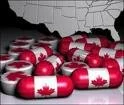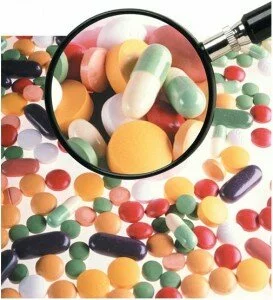
Above is a photograph by Eric Seals of the Detroit Free Press. It depicts James and Geraldine Keon, who for the past three years have regularly purchased their prescription drugs from Canada.
The Free Press profiles the Keons and other Americans who use Canadian pharmacies as part of a story on drug reimportation published over the weekend.
The piece is a bit too heavily influenced by Big Pharma lobbyists and their government cronies, who raise the usual bogeyman arguments about Canadian drugs. But a few important points shine through –
- One congressional estimate says Americans could save $50 billion over 10 years if the nation permitted U.S.-manufactured drugs to be reimported from Canada and other nations where price controls on pharmaceuticals hold down costs.
- Even PhRMA and the FDA acknowledge there haven’t been widespread incidences of people falling ill or dying from adulterated, counterfeit or mislabeled drugs purchased via Internet pharmacies.
- “Some industry groups out there have clearly been active in a public relations campaign to make it seem like buying drugs from Canada is not safe,” said Gabriel Levitt, PharmacyChecker’s vice president. “To scare Americans who are getting their prescriptions safely is borderline unethical.”
The article also offers these four tips for buying from Canadian pharmacies:
- Have the name of the pharmacy and its address, phone, license number and province. The information should be clearly identified on the company’s Web page.
- Buy drugs only through pharmacies affiliated with the Canadian International Pharmacy Association, a trade group.
- Buy only from pharmacies that require a prescription from the patient’s U.S. physician.
- The pharmacy must have a Canadian physician who reviews the prescription, as well as pharmacists available for consultation.
All Canadian pharmacies in the eDrugSearch.com network meet these criteria.
 A new U.K. report, “Prospects for Legalizing Drug (Re-)Importation to the United States“, has been released on the topic of U.S. citizens buying drugs from online Canadian pharmacies and other Tier One countries, such as the U.K., Australia and Japan. The report promises insight and analysis on these key questions:
A new U.K. report, “Prospects for Legalizing Drug (Re-)Importation to the United States“, has been released on the topic of U.S. citizens buying drugs from online Canadian pharmacies and other Tier One countries, such as the U.K., Australia and Japan. The report promises insight and analysis on these key questions:
- Will the drug reimportation bill pass?
- Where would supplies come from?
- What would be the risks and savings for consumers?
- What would be the risks and opportunities for industry players?
The report, issued by London-based Report Buyer, presents itself this way:
With public and private payers across the country seeking to save every healthcare dollar to get through the economic recession, [Sen. Byron] Dorgan senses a ‘bit of a tailwind’ behind his proposal this time. His supporters are tackling their critics head on with claims that rather than it being dangerous the measure will actually improve drug safety…
Whether you want to protect your business in the US, assess the potential for becoming a player in what could be a new channel or a supplier to it, or are concerned about the knock-on effects in the 20 countries initially named as potential sources (inc. Australia, Canada, France, Germany, Italy, Japan, Spain and the UK) this report is essential reading.
Unfortunately, the report is a pricey $1,600, so unless you have a specific business interest in this legislation, you’re probably better off waiting to see how things unfold rather breaking the piggy bank for this one.
Or you can just keep reading the eDrugSearch Blog. After all, we’re free.
 We are sometimes asked why we include a number of U.S.-based pharmacies in the eDrugSearch.com pharmacy directory, since prescription drugs are so much cheaper at Canadian pharmacies. One of the main reasons is that U.S. pharmacies often sell generic drugs at lower prices than their Canadian counterparts.
We are sometimes asked why we include a number of U.S.-based pharmacies in the eDrugSearch.com pharmacy directory, since prescription drugs are so much cheaper at Canadian pharmacies. One of the main reasons is that U.S. pharmacies often sell generic drugs at lower prices than their Canadian counterparts.
A new study by the Fraser Institute, “Canada’s Drug Price Paradox,” compares Canadian and American drug prices for the 100 most commonly prescribed brand-name drugs, as well as the 100 most commonly prescribed generic drugs. The study found that while brand-name drugs are much more expensive in the United States, generic drugs cost more in Canada.
After currency adjustments, Canadian retail drug prices for brand-name drugs in 2007 averaged 53 percent lower than the United States — compared to 51 percent lower in 2006 and 43 percent lower in 2003.
Canadian retail drug prices for generic drugs, meanwhile, averaged 112 percent higher than United States prices, compared to 115 percent higher in 2006.
The Fraser Institute, which is attached to conservative political causes, blames the disparity in generic drug pricing on three Canadian government policies that “distort” prices. These policies are:
- Provincial and federal drug programs direct public reimbursement of prescriptions to pharmacies instead of consumers; as such, it insulates customers from the costs and removes incentives for comparison shopping, which would pressure companies to lower prices.
- Public drug programs reimburse generics at a fixed percentage of the original, brand-name drug; under such a program, there is no incentive for retailers to compete and undercut prices.
- Federal prices controls on patented drugs unintentionally prevent brand-name drug companies from reducing prices on these products once a patent expires; these price controls create an artificial incentive for brand-name companies to resist competing on the basis of price with generic firms for sales of off-patent drugs.
The Fraser Institute argues that Canada’s disruption of the free market with price controls has had the unintended impact of raising prices of generic drugs. It argues that free markets allow companies like Wal-Mart to foster price competition with their $4 generic drug program, which has been matched by several other major retailers.
This is all certainly true.
But you know what? It’s also true that brand-name drugs are so expensive in the United States for the same basic reason: a lack of price competition.
Why is there a lack of price competition in the United States, the supposed home of free and unobstructed markets? Because the government has been giving drug companies monopoly protection of their drugs — which they are allowed to extend for years and years by playing games with the FDA.
Guess what? When there’s a monopoly, it ain’t a free market. You pay what you’re told to pay, and if you don’t like it, you’re out of luck.
The Fraser Institute fails to point that part of the problem out.
And really, this failing is a microcosm of what’s been wrong with U.S. policy toward the pharmaceutical industry over the past three decades. Politicians say they’re in favor of free markets, but their behavior suggests that they are actually in favor of big business, even when big business is opposed to free markets.
Coincidentally, these are the same big businesses that line politicians’ pockets and fill their campaign war chests.
We are cautiously optimistic that things will change in the current administration. But this can only happen if Americans continue to support President Obama’s agenda for change — and are not dissuaded by Big Pharma disinformation.
Source
Consumer Reports says buying prescription drugs from Canada can be a smart strategy for cost-conscious consumers. Here’s the magazine’s advice:
You can often save 25 percent or more [using mail-order pharmacies]. Buying brand-name medications from Canada can boost your mail-order savings, sometimes up to 50 percent. Generics, however, are cheaper in the U.S. And drugs bought in Canada will not count toward your Medicare Part D deductible.
While it’s illegal to buy drugs from foreign countries, including Canada, because of safety concerns, the FDA may refrain from taking legal action if you can provide your doctor’s name, address, and phone number, and confirm that the drugs are for personal use.
If you wish to explore this option, look for pharmacies with the Canadian International Pharmacy Association seal. Go to eDrugSearch.com, to get safe access to affordable medications from licensed online pharmacies, for the highest-rated sites.
We’d clarify that while some generics are cheaper through U.S. online pharmacies (which is one reason we include U.S. pharmacies in the eDrugSearch.com system), others are not.
As eDrugSearch.com members know, the Canadian International Pharmacy Association (CIPA) and PharmacyChecker.com are both friends of eDrugSearch.com. All eDrugSearch.com member pharmacies are required to have PharmacyChecker.com approval, and most also have the CIPA seal. You can learn more about our pharmacy approval process here.
About this Angie’s List Expert: Cary Byrd is the president and founder of eDrugSearch.com. Based in San Antonio, eDrugSearch.com is a free cost comparison engine that helps consumers get safe access to affordable medications and advocates licensed online pharmacies as a widely accepted alternative.
-
 Subscribe in a reader
Subscribe in a reader -
Ads

-
-
How to Safely Buy Prescription Drugs Online from Cary Byrd on Vimeo.
-
Medi-Share: Christian Health Insurance Alternative

-
Search Blog Posts
-
Blogroll
- DrugWonks.com
- Eye on FDA
- Health 2.0
- Kevin, M.D.
- Pharm Aid
- Pharma Marketing
- PharmaGossip
- Pharmalot
- The Health Care Blog
- The Peter Rost Blog
- World Vision
-
Our Healthcare100 Ranking
-
Archives
-
Tags
adverse drug reactions Affordable Care Act big pharma Canadian drugs canadian pharmacies canadian pharmacy compare drug prices consumer reports CVS pharmacy divine healing Drug costs Drug Importation Drug Prices eDrugSearch.com FDA Fosamax healing scriptures Health 2.0 healthcare100 healthcare reform high drug costs Hypertension Jehova Rophe Jesus Christ Lipitor mail order pharmacies Medi Share miracles Obamacare online pharmacy dictionary osteoporosis personal drug importation Pharmacies pharmacy spam Prescription drugs Proverbs 3:5-8 reimportation relenza Roche rogue online pharmacies saving money Tamiflu The Great Physician The Lord our Healer wal-mart
